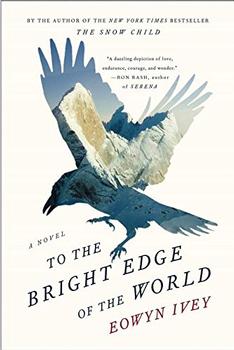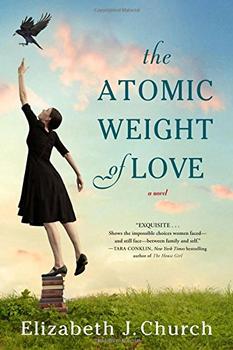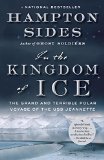Summary | Excerpt | Reviews | Beyond the book | Read-Alikes | Genres & Themes | Author Bio

It is with a mix of excitement and trepidation that many of us embark upon Eowyn Ivey's second novel, such was the brilliance of her eloquent debut, The Snow Child. It was an outstanding read for me – one that has yet to be surpassed.
Resting firmly in the Alaskan wilderness she lives in and imagines so well, inspired by the little known historical figure Lieutenant Henry Allen and his Report of an Expedition to the Copper, Tananá, and Kóyukuk Rivers (See Beyond the Book), in this novel, Ivey recreates a river expedition by a fictitious Colonel and his crew, tracing their steps and encounters through letters, journal entries, illustrations, photographs and inventory items depicting that bright edge of a magical, natural world.
We are introduced to the story through a letter and donation to Josh Sloan, Exhibits Curator of Alpine Historical Museum, containing letters, journals and artifacts from Walter Forrester's great uncle's 1885 Alaskan expedition. This modern day correspondence frames the story, narrated through items that Josh reads and observes, as he discovers the characters involved and events that transpired around that journey.
Walter warns Josh that some of his Uncle's entries are "downright fantastical", offering excuses for occurrences described as hallucinations, insisting he was neither a "hysteric nor a charlatan," paving the way to introduce magical elements the men encounter on their journey, including the raven apparition on the cover.
When we meet newly married, decorated war hero Lieutenant-Colonel Allen Forrester (and his wife Sophie), he is preparing to embark on a reconnaissance expedition up the Wolverine River to map the interior and document information regarding the potential threat of native tribes. Plans for Sophie to travel part of the way with them are shelved when it is discovered she is pregnant, allowing her character to emerge through correspondence and journal entries.
The development of Sophie is one of the more memorable joys of the novel; spurning the military wives' gatherings and gossip, she heroically pursues a passion for photography, a complicated endeavor in that era. Her patient observations of wildlife provide a poignant counterpoint to the harsh conditions of the expedition. Her obsession is ultimately life-changing.
It is a journey that heralds change and demonstrates alternate ways of viewing and living in the world. The Colonel and Sophie's accounts are written in the more formal voice of the time, a voice that questions all, disbelieving anything beyond what the rational mind expects. The men experience things they find impossible to explain, and they reject warnings from the native American woman who accompanies them, believing they are superstitions born of ignorance. They ignore them to their peril. "She says we walk towards the land of the dead. From here on, nothing follows white man's rules. The old stories live. This is where her otter husband comes from."
Ivey cleverly juxtaposes the practical ambitions of Forrester and his crew against the deeply knowledgeable ways of the native Indians they travel with and encounter, whose warnings are communicated in a language of legend and symbolism. She acknowledges the vast terrain between their ways of thinking, the loss of a culture and tradition; and then searches for the good, demonstrating the tender aspect of ignorant explorers, opening their eyes to the mystical, even though they bury what they have witnessed to save face.
Having a slight aversion to stories that position colonists and explorers in an overly sentimental light, given the lack of respect inherent in much of their behavior towards indigenous populations, I wondered where Ivey was going with her portrayal of a man of war let loose in the wild depths of Alaska. She depicts the harshness and beauty of the landscape with her remarkable gift for elegant, picturesque prose, and provides her characters the benefit of the doubt, portraying them in sympathetic roles, though prone to their particular ignorance.
Through Josh's reflection on his reading, Ivey reminds us that while what has been lost is universally acknowledged, historical records of expeditions have contributed richly to our memory and preservation of the past: "It is a paradox, though. Where can we go to learn about Alaska's people, how they lived and worshipped and dressed and spoke before living memory? The explorers are witness to the before. The Colonel's diaries, like the writings of Meriwether Lewis and Captain Cook, are a kind of cursed treasure."
To the Bright Edge of the World is a novel that charts the recent history of a relatively untamed wilderness. It recognizes that the beauty and simplicity of a way of life that came before armies, prospectors and settlers would change it forever, while also looking back and accepting that if it were not for those who went first and documented what they found, little of that way of life would be known about. Little would be able to be appreciated today. And lest we forget, women always provide the balancing factor.
![]() This review was originally published in The BookBrowse Review in September 2016, and has been updated for the
August 2017 edition.
Click here to go to this issue.
This review was originally published in The BookBrowse Review in September 2016, and has been updated for the
August 2017 edition.
Click here to go to this issue.

If you liked To the Bright Edge of the World, try these:

by Elizabeth Church
Published 2017
In the spirit of The Aviator's Wife and Loving Frank, this resonant debut spans the years from World War II through the Vietnam War to tell the story of a woman whose scientific ambition is caught up in her relationships with two very different men.

by Hampton Sides
Published 2015
New York Times bestselling author Hampton Sides returns with a white-knuckle tale of polar exploration and survival in the Gilded Age. Winner of the 2014 BookBrowse Award for Nonfiction.
Your guide toexceptional books
BookBrowse seeks out and recommends the best in contemporary fiction and nonfiction—books that not only engage and entertain but also deepen our understanding of ourselves and the world around us.